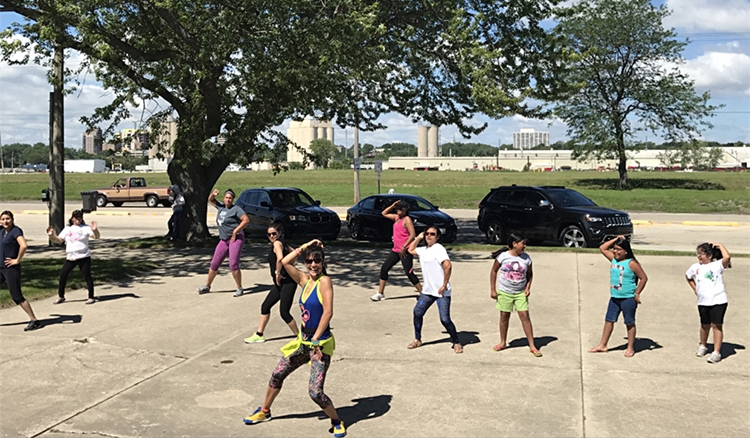 Open to Latina women and their children, Maryclaret Ndubuisi-Obi's initiative offers regular exercise sessions, meditation, bilingual guided nature walks and free health screenings. (Image courtesy of DePaul Magazine)
Open to Latina women and their children, Maryclaret Ndubuisi-Obi's initiative offers regular exercise sessions, meditation, bilingual guided nature walks and free health screenings. (Image courtesy of DePaul Magazine)
College of Science and Health graduate students Maryclaret Ndubuisi-Obi and Christina Ebertsch were among 30 Chicagoland students selected for the competitive Schweitzer Fellowship, a yearlong service-learning program. Both Ndubuisi-Obi and Ebertsch are pursuing Master's Entry to Nursing Practice degrees in the School of Nursing. Read on to learn more about their Schweitzer Fellowship projects.
Building Healthy Habits
In every place she's lived, including Nigeria, Ethiopia and the South Side of Chicago, Ndubuisi-Obi has made it her mission to understand the local population. So when she moved to a predominantly Latino community in Waukegan, Ill., Ndubuisi-Obi immersed herself in neighborhood life.
"I learned from community members that health disparities in minority populations are highly complex and multifaceted," she says. "Many people couldn't navigate health care resources and services due to the language barrier and a lack of understanding of the health care system."
Other barriers to healthy living were also affecting her neighbors. "Some were overwhelmed by the stressors of life and didn't have a healthy way to release stress," Ndubuisi-Obi says, pointing to anxiety over immigration policies as one lingering concern. "They also refrained from participating in physical activities like walking because they feared for their safety and faced a lack of social support."
All of these issues are addressed through Ndubuisi-Obi's project, which draws on the resources of Roberti Community House, the Lake County Forest Preserves, Lake County Health Department, the Waukegan Park District and Rosalind Franklin University of Medicine and Science. Open to Latina women and their children, her initiative offers regular exercise sessions, meditation, bilingual guided nature walks and free health screenings. The latter incorporates workshops on chronic illnesses to help bridge the gap between health literacy and access. "I want to empower this community to take charge of their circumstances and actively participate in improving their overall health," Ndubuisi-Obi asserts.
A Community of Hope
Ebertsch's project also developed out of personal experience. Like many, she has watched close friends and family members struggle with, and in some cases succumb to, cancer. "One of the overarching goals of my program is to provide hope," she says. "We want to let patients know that they are not alone during this process."
In tandem with Phil's Friends, a Christian nonprofit, Ebertsch leads weekly cancer support groups at Rush University Medical Center. The sessions are open to any cancer patient in the hospital's outpatient waiting room, and every participant also receives a small care package.
Each session focuses on a certain topic, such as nutrition, depression, family support, self-esteem or mindfulness, and includes an activity.
"For example, we might make ornaments or decorate cookies during the Christmas season," Ebertsch says. "The activities serve as an outlet and enable patients to remain present in the discussions as much or as little as they desire."
Ebertsch emphasizes the need for compassion when working with this vulnerable population and says that her studies at DePaul have helped her develop communication skills, empathy and a better understanding of the patient-provider relationship.
"These patients are facing one of the biggest challenges of their lives," she notes. "It's my privilege to be there for them."